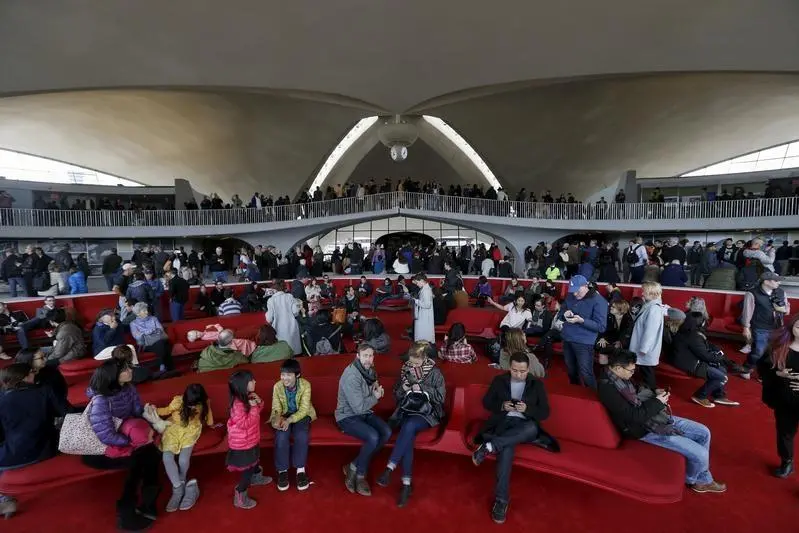PHOTO
By Yeganeh Torbati
WASHINGTON, July 29 (Reuters) - The United States said on Friday it would allow foreign airlines to fly U.S.-made aircraft to Iran, providing greater assurance to aviation companies as Iran tries to re-establish trade and business links following the lifting of sanctions.
The U.S. Treasury's Office of Foreign Assets Control on Friday issued a license allowing U.S.-made planes to have "temporary sojourn" in Iran, meaning airlines such as Lufthansa, Turkish Airlines, or others flying frequently to Iran are expressly allowed to use U.S.-made planes, or planes with U.S. parts, to fly there.
Iran and world powers reached a deal on Tehran's nuclear program last July that allowed for the lifting of most sanctions on the country, although many U.S. sanctions remain in place.
The deal allows for U.S. companies to obtain licenses to sell civil aircraft to Iran, but a proposed deal between Boeing Co.
The license issued on Friday has no impact on the proposed Boeing deal.
Because of a quirk in the law, U.S.-made planes could be flown to other countries under U.S. sanction, such as Cuba, Sudan, Syria, and North Korea. Iran was an exception to this, said Jonathan Epstein, an attorney at Holland & Knight in Washington.
"Technically there was no legal way to fly to Iran, so U.S. lessors tended to say no, or it caused a lot of angst in the U.S. leasing community that these planes were being flown there," said Epstein, who advises aviation leasing firms on sanctions issues.
Practically speaking, many airlines were already flying U.S.-made planes or those using significant amounts of U.S. parts, Epstein said. But Friday's announcement resolved some of the ambiguity surrounding such trips, he said.
"It was technically not allowed but was akin to speeding," Epstein said. "The foreign airlines were flying ... but the leasing company took different views on whether they allowed this or not."
Treasury outlined several conditions for its allowance, including that the planes stay in Iran no longer than 72 hours at a time. It also only covers fixed-wing aircraft rather than aircraft like helicopters. Companies are also not allowed to store spare parts in Iran, among other conditions.
(Reporting by Yeganeh Torbati; Editing by Sandra Maler) ((Yeganeh.Torbati@thomsonreuters.com; +1-202-445-7940))
WASHINGTON, July 29 (Reuters) - The United States said on Friday it would allow foreign airlines to fly U.S.-made aircraft to Iran, providing greater assurance to aviation companies as Iran tries to re-establish trade and business links following the lifting of sanctions.
The U.S. Treasury's Office of Foreign Assets Control on Friday issued a license allowing U.S.-made planes to have "temporary sojourn" in Iran, meaning airlines such as Lufthansa, Turkish Airlines, or others flying frequently to Iran are expressly allowed to use U.S.-made planes, or planes with U.S. parts, to fly there.
Iran and world powers reached a deal on Tehran's nuclear program last July that allowed for the lifting of most sanctions on the country, although many U.S. sanctions remain in place.
The deal allows for U.S. companies to obtain licenses to sell civil aircraft to Iran, but a proposed deal between Boeing Co.
The license issued on Friday has no impact on the proposed Boeing deal.
Because of a quirk in the law, U.S.-made planes could be flown to other countries under U.S. sanction, such as Cuba, Sudan, Syria, and North Korea. Iran was an exception to this, said Jonathan Epstein, an attorney at Holland & Knight in Washington.
"Technically there was no legal way to fly to Iran, so U.S. lessors tended to say no, or it caused a lot of angst in the U.S. leasing community that these planes were being flown there," said Epstein, who advises aviation leasing firms on sanctions issues.
Practically speaking, many airlines were already flying U.S.-made planes or those using significant amounts of U.S. parts, Epstein said. But Friday's announcement resolved some of the ambiguity surrounding such trips, he said.
"It was technically not allowed but was akin to speeding," Epstein said. "The foreign airlines were flying ... but the leasing company took different views on whether they allowed this or not."
Treasury outlined several conditions for its allowance, including that the planes stay in Iran no longer than 72 hours at a time. It also only covers fixed-wing aircraft rather than aircraft like helicopters. Companies are also not allowed to store spare parts in Iran, among other conditions.
(Reporting by Yeganeh Torbati; Editing by Sandra Maler) ((Yeganeh.Torbati@thomsonreuters.com; +1-202-445-7940))





















